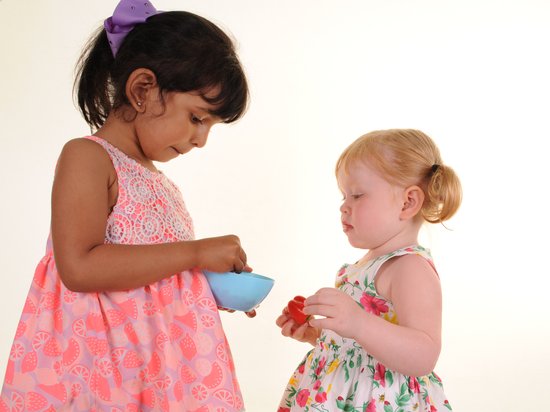Children love to copy so it's important that they see good role models eating a variety of foods.

Parents, siblings, family members, friends and even strangers can be powerful role models for children. Children learn through simply watching other people which means that our own behaviour can easily be picked up and copied by children.
In relation to eating, this means that children are likely to imitate the eating behaviours of people they spend time with. This includes parents, primary caregivers, brothers and sisters, friends and peers, as well as extended family.
Why is it important to be a good role model?
Children are like sponges, picking up habits and behaviours from those they see around them. This means that role models can play a really important part in shaping children's eating habits. Role models can come in one of two forms: healthy role models and unhealthy role models.
Research shows that children whose parents eat more fruit and vegetables typically eat more of these foods themselves, but that children whose parents eat more savoury snack foods consume more of these too.
Children are as likely to copy the healthy eating habits that they observe others exhibiting as they are the unhealthy ones.
What can I do instead?
Try to ensure that you are modelling healthy eating behaviours in front of your child. If you want your child to eat a new food, they need to see you eating it too. If you don't want your child to eat a particular food, don't eat that food in front of them.
Things to try
- Eat together
Shared mealtimes are a great opportunity for children to pick up healthy eating habits. They can also be a chance for children to try a new food which they might see others eating and enjoying. - Talk about foods you enjoy
Commenting on foods that you like can help direct children's attention to that food and encourage them to try it too. For example, "Daddy really likes green beans" or "Look how crunchy these carrots are". - Avoid making negative comments about foods
We don't all like the same foods, and that's fine, but avoid commenting on disliked foods (e.g., "urgh, I don't like celery at all") as children are very likely to pick up on it and it can make them much less likely to want to try these foods. Keep thoughts about disliked foods to yourself. - Use others as good role models
Siblings, other family members or friends can be very helpful for encouraging children to try a food. Remember never to pressure or force a child to eat something s/he doesn't want to, but seeing others eating foods can help children to realise that the food is safe to eat, which can make them more willing to try it.
Above all, eat a wide variety of healthy foods in front of your child. This is the best way to help your child to do the same.